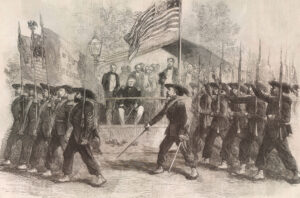Today’s presidents begin planning their libraries even before they leave office, but in Abraham Lincoln’s day such libraries did not exist, nor was there any formal procedure for collecting presidential documents. The Papers of Abraham Lincoln Project, led by director Daniel Stowell, is making up for that by canvassing the country for documents written to, signed by or forwarded to Lincoln (papersofabrahamlincoln.org). “It’s a great experience, a great detective story and a great puzzle,” according to Stowell.
What is the Papers of Abraham Lincoln Project?
Back in the late 1940s and 1950s, the Abraham Lincoln Association assembled what is referred to as the Collected Works of Abraham Lincoln. That has been the standard documentary source for Lincoln studies and Civil War studies that touch on Lincoln’s life and career for about 70 years now. About 32 years after the Collected Works was published, the Abraham Lincoln Association and the state of Illinois partnered to start the Lincoln Legal Papers project, and that was to assemble all the papers from Lincoln’s 25-year legal career.
When I became the director in 2000, I suggested that the Lincoln Legal Papers be expanded into the papers of Abraham Lincoln. The Collected Works of Abraham Lincoln was just that: his correspondence and his speeches, but it didn’t include the incoming correspondence and was only lightly annotated. So we made that case to the state of Illinois and the Abraham Lincoln Association— and by this point we also had as a partner the University of Illinois–Springfield—and they agreed to expand the mission. We basically converted the Lincoln Legal Papers into Series 1 of the Papers of Abraham Lincoln, which was completed in 2008; Series 2 is the Illinois papers that includes Lincoln’s pre-presidential correspondence and speeches. And Series 3 is the presidential papers.
What makes something a Lincoln document?
Any document written by, signed by or endorsed by him is in our scope, and any letter written to him or forwarded to him (for example, a letter written to a senator and forwarded to Lincoln). And anything that we have evidence that it crossed his desk for his consideration. Documents about Lincoln are outside our scope. For specific guidelines on what we’re looking for and how to submit a Lincoln document, go to our website, papersofabrahamlincoln.org.
How do you look for the documents?
It is a vast undertaking. We have a benefit in that Abraham Lincoln is the most written-about president in history, and we have the Collected Works to rely on in identifying repositories with known substantial collections of Lincoln material. In 2003 we sent a mail survey to thousands of universities, archives and historical societies; we sent it to every county historical society in Illinois and surrounding states and to museums and anyplace that might have documents. We followed that up with a phone survey and got a pretty decent response. We got a core list of 300 repositories all over the country that had Lincoln documents or documents sent to Lincoln. From 2004–2008 we went out, typically in teams of two, and by the end we had thousands of documents from probably 45 states.
Where are most of them found?
We knew that the major untapped reserves would be at the Library of Congress because of the Abraham Lincoln papers there, donated by his son Robert in the early 20th century. Of about 20,000 in that collection, only 1,500-2,000 were written by Lincoln; others were excluded from The Collected Works of Abraham Lincoln, and we also knew the National Archives had a vast number of documents. And we began work with two researchers in 2006 at the National Archives—that search is still underway. Thus far we’ve identified about 61,000 documents at the National Archives, about 25,000 at the Library of Congress and about 25,000 at the Library of Congress. And his Cabinet officers and Civil War generals have papers/collections at the Library of Congress. Right now we’re at about 99,000 documents: maybe 61,000 from the National Archives, 25,000 from the Library of Congress and the remainder from over 400 repositories and over 200 private collections. We’re up to 48 states and at least half a dozen countries. And we still find things.
What is the goal?
The Papers of Abraham Lincoln doesn’t collect any paper. We are collecting high-resolution color digital images to make them all available online and searchable with their transcriptions. The key is to do the transcription and then put the material in context for the reader. The end result is an electronic archive of documents.
How long will you be looking for documents?
I would estimate another five years of searching at the National Archives. That’s the search phase. The transcription and contextualization is for the most part occurring in Springfield. There are 98,000 documents in our database; of those, approximately 32,000 have any sort of transcription.
What is your funding?
In ballpark numbers: Currently 45 percent are state funds through the Abraham Lincoln Presidential Library and Museum, and the University of Illinois–Springfield; about 25 percent is federal, with two main grants—one from the National Endowment for the Humanities and one from the National Historical Publications and Records Commission. The remainder is private: individual donations, foundations and so forth. It’s a three-legged stool. The length of each leg varies from year to year.
Are documents turning up outside the United States?
As I was doing research, I came across a letter from Alexandre Dumas—author of The Three Musketeers and other works—to Lincoln that had been published in a French newspaper from late 1865 and has since been digitized. It turns out that Pittsburgh had a sanitary fair [an aid and fundraising event] in 1864 and wanted to auction off famous people’s autographs, so they wrote to Dumas and for whatever reason he replied to Lincoln. He was so enthusiastic about the Union cause that he sent 100 copies of his autograph to be auctioned off.
What has surprised you most?
There’s a persistent myth that Lincoln started out with simple debt cases and then became a corporate attorney for the railroads, and that’s just not true. He was still handling simple debt cases in 1859 and 1860, and he wasn’t doing railroad work in 1830 and 1840s because there weren’t railroads. He sued railroads about as many times as he represented them.
But this is not an archive for Lincoln biographers alone. I would like to suggest immodestly that when we’re done no one will be able to write a book about the Civil War era without finding something useful in our online edition.
Originally published in the February 2015 issue of Civil War Times. To subscribe, click here.




